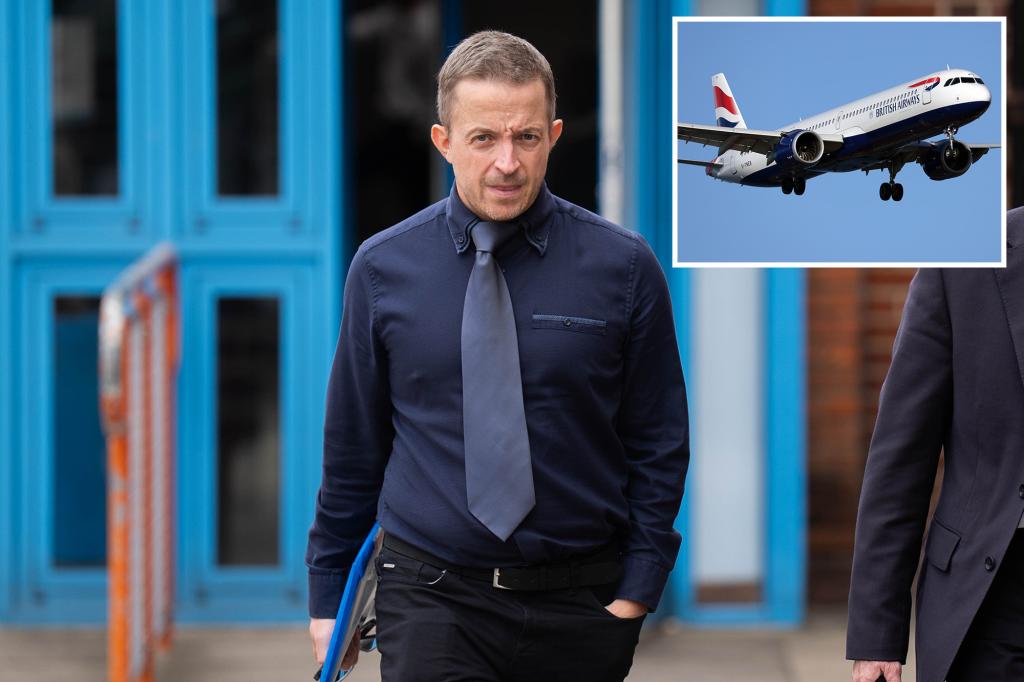Flight Attendant’s Drug-Induced Incident at 30,000 Feet
In a shocking incident that redefined inappropriate workplace behavior, a British Airways flight attendant found himself at the center of an embarrassing scandal when he was discovered naked and under the influence of drugs while on duty during a transatlantic flight. The 41-year-old crew member, Haden Pentecost, was supposed to be ensuring passenger safety on a flight from California to London’s Heathrow Airport. Instead, he created a disturbing spectacle that ultimately cost him his job and led to criminal charges. The case has highlighted concerns about airline safety protocols and the screening of crew members entrusted with passenger welfare during flights.
The incident unfolded dramatically when Pentecost’s concerning behavior caught the attention of his colleagues early in the flight. Fellow crew members noticed he appeared agitated, was visibly sweating, and spoke in an incoherent manner described as “babbling.” Most alarmingly, he completely failed to participate in the mandatory pre-flight safety checks—a critical responsibility for any flight attendant. His increasingly erratic behavior prompted his manager to remove him from his duties, recognizing that something was seriously wrong. What began as concerning unprofessional conduct soon escalated into a full-blown crisis at 30,000 feet when Pentecost excused himself to use the lavatory, claiming he was suffering from cramps and needed to change his clothes.
The situation took an even more disturbing turn when, after an extended absence, a concerned colleague went to check on Pentecost’s wellbeing. What they discovered was beyond anything they could have anticipated—the flight attendant was completely naked in the bathroom stall, displaying clear signs of drug intoxication including dilated pupils and an elevated heart rate. The colleague was forced into the uncomfortable position of helping their incoherent coworker get dressed before he could be moved to an empty seat in the cabin. Throughout this ordeal, Pentecost remained in an altered state, seemingly unaware of the severity of his actions or the potential safety implications for the hundreds of passengers on board the international flight.
The crew implemented an impromptu monitoring protocol, checking on Pentecost every 20 minutes for the remainder of the flight to ensure he didn’t pose any further risk to himself or others. Upon landing at Heathrow, he was immediately transported to a local hospital for medical assessment. Subsequent toxicology reports revealed the presence of multiple illicit substances in his system, including methamphetamine and amphetamines. These findings confirmed what his behavior had already suggested—that Pentecost had reported to work while under the influence of potent stimulants, substances strictly prohibited for aviation professionals and particularly dangerous in the context of a pressurized aircraft cabin miles above the earth’s surface.
The consequences for Pentecost were swift and severe. British Airways terminated his employment, ending his career with the airline. Beyond professional repercussions, he also faced legal accountability for his actions. When brought before the Uxbridge Magistrates’ Court, Pentecost pleaded guilty to the serious charge of performing an aviation function while impaired by drugs. The case was deemed significant enough to be referred to the Isleworth Crown Court for sentencing, reflecting the gravity with which the legal system views safety violations in commercial aviation. Pentecost was granted bail while awaiting his sentencing hearing, where he potentially faces imprisonment for compromising flight safety.
This incident raises profound questions about airline industry protocols and the effectiveness of current systems designed to ensure crew members are fit for duty. The case has prompted discussions about whether random drug testing should be more rigorously implemented for flight crews, similar to practices in other safety-critical industries. For passengers, the incident serves as a disquieting reminder of how dependent their safety is on the professionalism and sobriety of the crew members responsible for their wellbeing during flights. While British Airways has emphasized that this was an isolated incident not reflective of their thousands of dedicated employees, the case nevertheless highlights vulnerabilities in a system where a single impaired crew member can potentially jeopardize hundreds of lives. As Pentecost awaits sentencing, his case stands as a cautionary tale about the severe personal and professional consequences of bringing substance abuse problems into safety-critical workplace environments.


